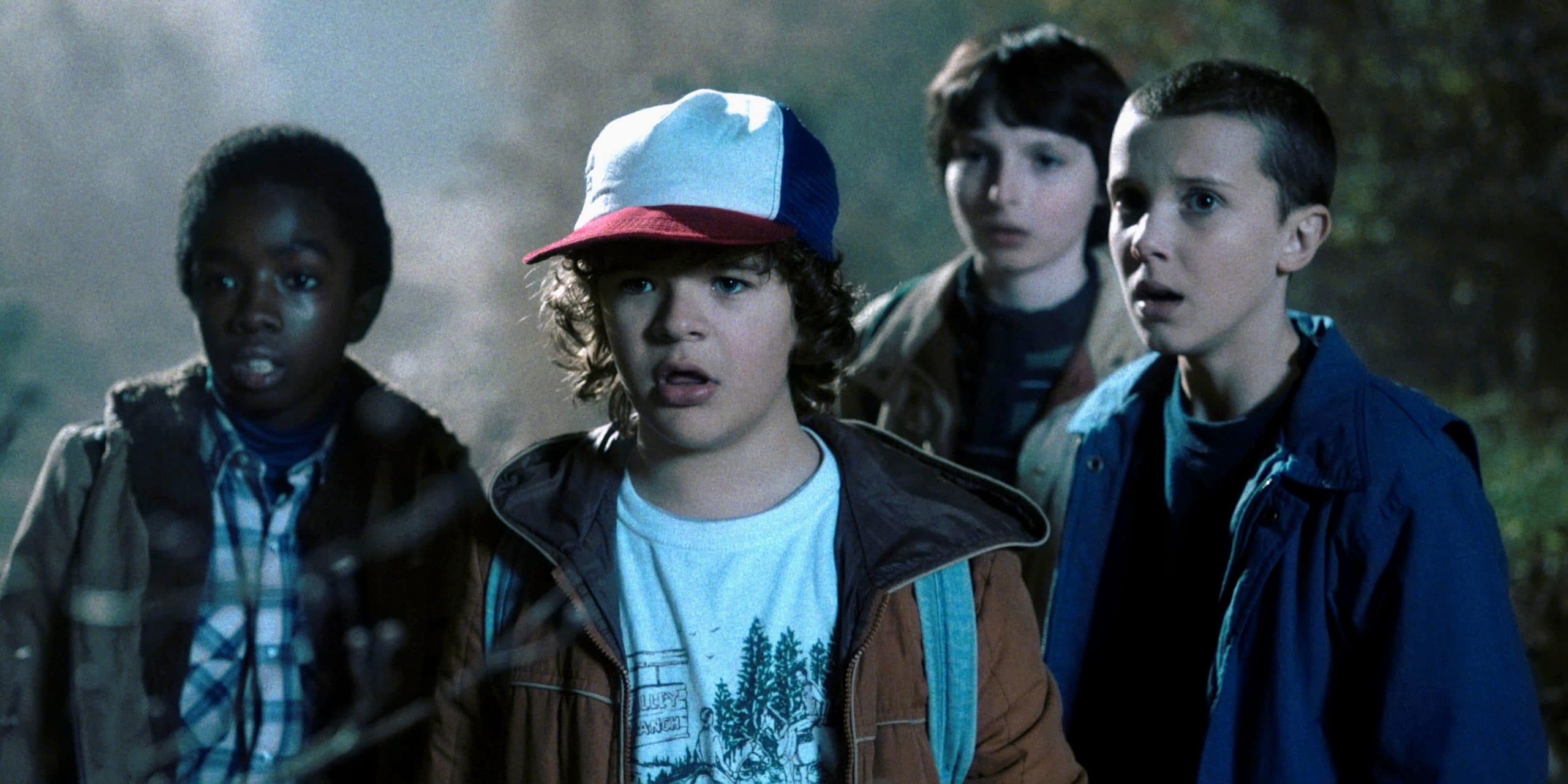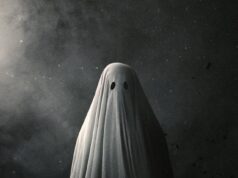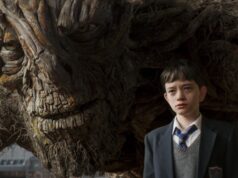A refreshing homage to the ‘80s (especially Steven Spielberg’s movies) that will be pure nostalgia for those who grew up in that decade
Stranger Things — First Season (2016)
Created by Matt Duffer and Ross Duffer (The Duffer Brothers). Starring Winona Ryder, David Harbour, Finn Wolfhard, Millie Bobby Brown, Gaten Matarazzo, Caleb McLaughlin, Natalia Dyer, Charlie Heaton, Cara Buono and Matthew Modine. Also starring Noah Schnapp, Joe Keery, Shannon Purser and Ross Partridge.
One of the best feelings that those who grew up in the 1980s will probably have when watching Netflix hit series Stranger Things is, of course, nostalgia. Matt and Ross Duffer made something that truly looks and feels like it was made in the ‘80s. The aesthetics, the style, the electronic music…everything screams ‘80s and brings to mind especially the movies made by Steven Spielberg in that decade. Then, after nostalgia, comes curiosity. There are so many gripping (and seemingly unrelated) mysteries in Stranger Things that anyone curious enough will be instantly hooked — and if there is one thing that the show knows how to do, it’s to make us crave for more. Don’t be surprised if you see yourself binge-watching the whole season at once.
But at the same time, I must admit, I felt a bit of fear. The only film that the Duffers made before, Hidden (2015), also relied on a compelling mystery that kept us on the edge of our seats, dying of curiosity to finally know what it was all about. When everything was finally revealed, however, the movie nearly collapsed, unable to bring the twists and revelations into a coherent whole without creating plot holes and inconsistencies. Considering the huge amount of narrative elements that Stranger Things brings to the table, I feared what I now call the “Lost Syndrome” (yes, a hint to the excellent but overly labyrinthine TV show); that is, a lot of mysteries and questions but too much confusion to answer them. Sometimes, my friends, less is more.
Still, in the present case, the Duffers manage to find a way of putting everything together after coming up with a lot of intriguing mysteries: the vanishing of a boy; a fugitive telekinetic girl; a faceless monster that crawls out of walls; a top-secret government lab trying to control a supernatural phenomenon; etc. Taking place in November of 1983 in the small town of Hawkins, Indiana, Stranger Things begins with the sudden disappearance of 12-year-old Will Byers (Noah Schnapp) after an encounter with a creepy creature that follows him home. From then on, what we follow is the desperate efforts of his friends, his mother Joyce (Winona Ryder) and police Chief Jim Hopper (David Harbour) as they try to find out where he is and bring him back.
One of the main complaints I have been hearing about the series is that it is not original. Why, of course it isn’t; it is supposed to be a throwback to the ‘80s. And originality doesn’t necessarily imply quality, nor does the lack of it mean it won’t be good. Tropes are tropes because they work, and more of the same can always be good if done well. So why not just enjoy and appreciate what it is trying to do, right? First of all, it is a wonder to see so much passion in re-creating the feel of the ‘80s, not only in the art direction — with its CRT televisions, typewriters and old telephones — but also with a music score that uses synthesizers and a soundtrack that includes The Clash, The Seeds, Toto, Jefferson Airplane, Foreigner, Joy Division, Echo & the Bunnymen and more.
Not to mention, of course, the gorgeous opening credits whose font obviously draws from old covers of Stephen King novels. Notice even the flickering of the image that makes it look like it was actually recorded on film. And let’s not forget the numerous visual — and narrative — references along the series to movies like E.T. the Extra-Terrestrial (1982), The Goonies (1985), Stand by Me (1986), Close Encounters of the Third Kind (1977), Poltergeist (1982) and, of course, Stephen King adaptations, like Carrie (1976) and Firestarter (1984). They are everywhere, like the key moment when the kids meet the strange telekinetic girl Eleven (Millie Bobby Brown) for the first time, a reference that will be very obvious for anyone who has ever seen E.T.
Speaking of which, some people have also complained that they wished the series focused more on the kids than so much on the adults. I personally love how it doesn’t make the discovery of the supernatural an exclusivity of children. Leading a great cast, Winona Ryder steals the show as the desperate mother who starts to believe that Will is trying to communicate with her through lights (Poltergeist, anyone?). It is a very intense performance, and she even convinces us that she would recognize her own son’s breathing over the phone. She is so good, in fact, that she makes us not want to kill her for screaming Will’s name the whole time in the most dangerous situations (there is a Demogorgon around, lady!)
But, of course, it is the kids who make Stranger Things as refreshing as those movies from the ‘80s, especially Gaten Matarazzo, who is hilarious and gets to have the best lines (“You really need to learn more about compasses”). Sometimes, these kids sound too much like adults, but they are always convincing. And the sense of humor is actually one of the best qualities of the show, which even includes a priceless joke on how easy it is for two teenagers to buy a whole lot of things in a gun shop in Indiana. As for the rest of the cast, David Harbour does a nice job as a character moved by a personal loss, while Matthew Modine is sadly wasted as a one-dimensional villain that seems more like a wax sculpture than a human being.
Stranger Things has its qualities, that’s right, and they include the effective visual effects (I love the design of the Upside Down with those small cotton-like particles floating in the air) and fantastic scenes such as a little girl seeing the Demogorgon coming out of a wall or the moment when Joyce devises a way of communicating with Will using Christmas lights. It is also a wonder to see a well-written dialogue like the one between Joyce and Hooper in the fourth episode, a lesson on how to avoid clichés such as “You are not well” and so on. And how could I not go crazy with a teacher’s wonderful explanation about the way to access another dimension or an awesome murder scene to the sound of “White Rabbit” by Jefferson Airplane?
While sometimes the show surprises us by offering hints and information that will be important later (“The water turns into cement. Hits you like a ton of bricks”), some things, on the other hand, are a bit obvious, like the good-hearted pure girl who wears mostly pink and feels divided between the school jock and the quiet kid who stalks people with his photographic camera. I don’t know if this is supposed to be a nod to the tropes and clichés of ‘80s movies, but it becomes more annoying when said quiet kid, Jonathan (Charlie Heaton), decides to sacrifice a wounded animal to spare the young damsel in distress from the burden of doing so.
Another problem is the uneven pacing. After an excellent first episode, the rhythm drops in the following two episodes, only to be lifted later again and so on. The sixth episode, for instance, is such a dull and predictable interlude. There are some inconsistencies here and there too. One example is Eleven being able to find the boys in the middle of nowhere and save them from two bullies, or the fact that initially she doesn’t seem to speak or understand English but later on manages to formulate entire sentences without much problem. And what to say of the ridiculous scene in which a girl screams but the only witness is conveniently looking down only a few meters away and doesn’t see or hear anything?
Stranger Things also gets a bit messed up with the rules of its own universe. For instance, if the Demogorgon can smell or sense even a drop of blood from another dimension, then why the hell doesn’t it show up every time Eleven bleeds from her nose? And I won’t even give too much thought about the insane agreement made in the final episode, which doesn’t really make sense (I mean, what would the villains gain from that anyway?)
But the show compensates for its flaws with a lot of conviction, finding even space to mention Michael Myers, He-Man and the occupation of Lebanon by Israel in the ‘80s. And despite a very long epilogue in the last episode, it does have a great conclusion — open enough to allow for a new season but wrapped up quite well to work as a definitive ending. As for me, I’m definitely hoping for more to come. I don’t think I’m done with the ‘80s yet.





